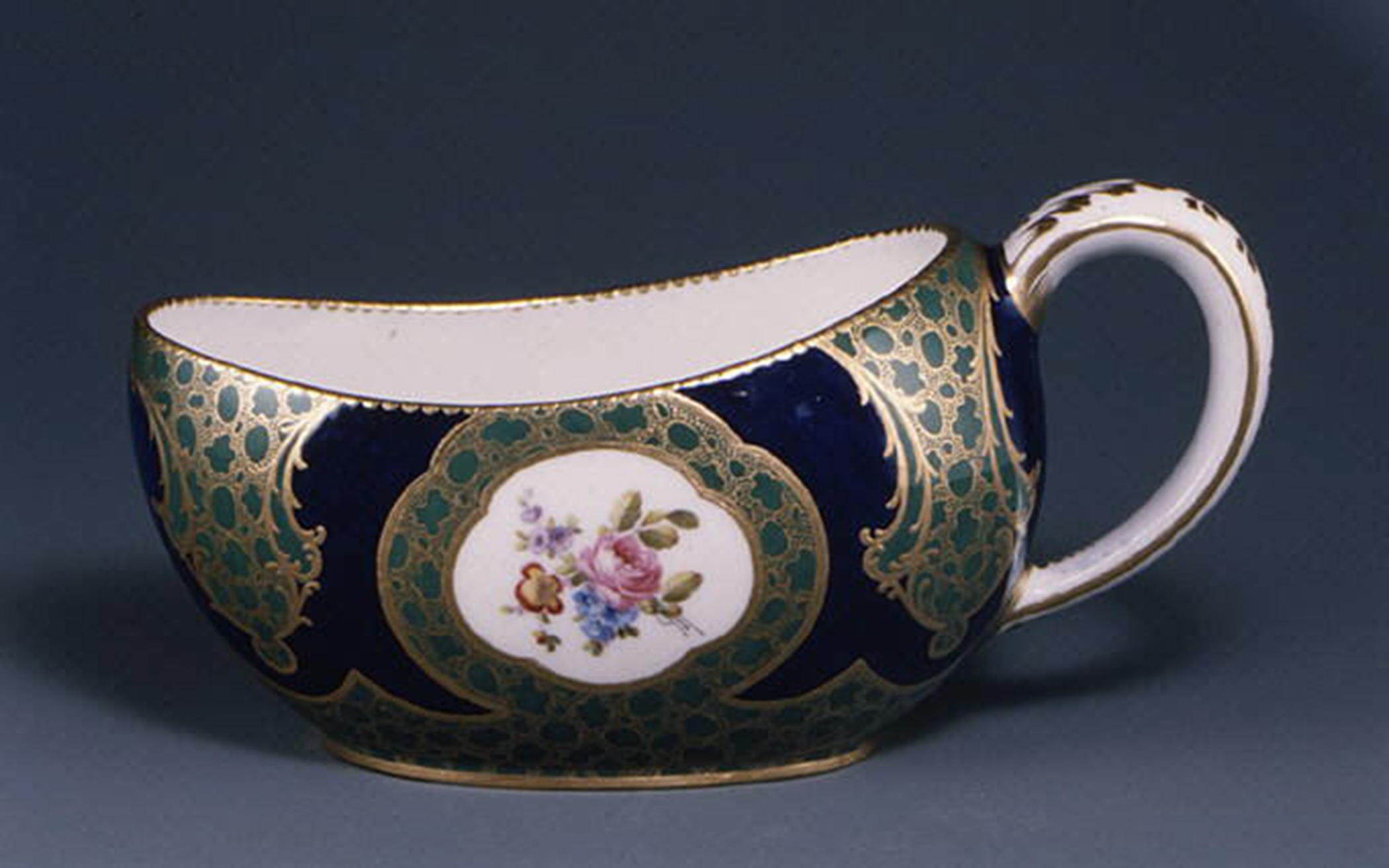Vessels
On the Upper East Side of Manhattan, a graceful black vessel with green and gold floral patterns sits confidently on a bedside table in the Lauzun Room at the Metropolitan Museum of Art. The French royal manufacturer at Sèvres produced this work. Baron Jérôme-Frédéric Pichon (1812-1896), a wealthy collector and bibliophile, may have owned it. It is a chamber pot, a receptacle for human waste in a time before plumbing or sewers were widely used. The quality of the pot and the purpose for which it was made cause mental dissonance and give new meaning to disposable wealth. Vessels should have appropriate uses. Gutted fish belong in a bucket after a long day at the dock, a fine wine in a crystal glass, a cup of Kopi Luwak coffee in a ceramic mug.
The apostle Paul writes that in a great house there are many vessels—gold, silver, wood, and clay. Some are for noble purposes, others for ignoble purposes. Greco-Roman homes possessed many types of vessels: amphorae for olive oil, glazed kraters for mixing wine for Hellenized homes, and terra-cotta cups for everyday use. Wealthier families had vessels of precious metals for special occasions. Juvenal, the Roman satirist, pokes fun at the conspicuous consumption of Rome’s elites, who liked to show off their silver goblets. Archeology confirms this. A well-known example comes from a Pompeian mosaic of a skeleton holding two well-proportioned wine cups called askoi. All homes, not just grand ones, had vessels of all shapes, sizes, uses, and materials.
Within the Jewish context, we see much the same with an added insight. In the temple, vessels abounded, and the preciousness of the material increased as it approached the Most Holy Place. A large bronze basin for washing rested on 12 statues of bulls at the entrance of the temple. A bronze pail held the ashes of the sacrifices, and a lamp, beaten in pure gold, contained the olive oil that illumined the Most Holy Place. Paul picks up this thread, theologizes it, and applies it to Timothy. Timothy belongs to the household of God and is a vessel; he will have to determine what kind of vessel he will be.
Bodies as Vessels
Paul’s illustration of vessels maps onto two better-known analogies. In 2 Corinthians 5, Paul likens the body to a tent. Paul writes with relief that our earthly tents are not permanent. Life is fraught with hardships, especially in the context of missionary labor. Paul enumerates what his earthly vessel went through: beatings, imprisonments, riots, sleepless nights, and hunger. His tent, his body, is in need of repair, but he does not lose heart because he awaits a heavenly tent. Furthermore, he has the Holy Spirit dwelling within him, reminding him of the renewal that is set in motion and will come to consummation. So even if his earthly tent is wasting away, he is being renewed inwardly through the Spirit of God. He makes a similar point in the previous chapter when he likens his body to an earthen jar. The pressures of life challenge the integrity of this vessel. Cracks, fissures, and bruises are visible, but inwardly Paul experiences glory through the Holy Spirit. Paul, a jar of clay, yes; a possessor of treasure in that jar of clay, even more so; a partaker of the weight of eternal glory, most certainly.
Paul’s theology of the temple lands in the same place. Paul reminds the Corinthians that sexual immorality ultimately is a sin not because of what it does to people or to society but because it offends the Holy Spirit. Believers are temples (vessels) of the Holy Spirit. Hence, what they do with their bodies matters. Uniting with a prostitute offends and quenches the pre-existing tenant, the Holy Spirit. Paul’s words cannot be clearer: “Do you not know that your bodies are temples of the Holy Spirit, who is in you, whom you have received from God? You are not your own; you were bought at a price. Therefore honor God with your bodies” (1 Cor. 6:19-20). In Paul’s theology, bodies house God. As such, people possess power when they allow the Holy Spirit to lead and direct them. The challenge, of course, is that it is difficult to cultivate a life of submission. History shows that people are like bent branches, chronically inclined toward sin.
The Choice of Vessels
Paul’s words to Timothy (2 Tim. 2:20-26) bypass superficial externals and pierce through joint and marrow and reach the vitals of a person. Paul’s directness arises from his impending death and his closeness to Timothy. If Timothy wishes to be a vessel of honor, then he must cleanse himself of what is dishonorable. Only a holy vessel will be used for holy purposes. And only a holy vessel will be useful to God and be ready for every good work. Such a calling demands that Timothy flee youthful passions and pursue righteousness, faith, love, and peace with others who are like-minded. This spiritual principle, without frills or flourishes or flattery, crashes into our modern sensibilities. The path to success is laid and layered with morality, not so much talent; righteousness, not so much opportunities; integrity, not so much networking. According to Paul, it is neither what you know nor whom you know that matters, but who you are.
I experienced this point in a bookstore in Princeton, New Jersey, 20 years ago. While I was attending seminary in Philadelphia, I used to drive up to northern New Jersey for Friday night services. On the way one Friday I stopped for a cup of coffee. As I sat skimming a theological book, an older gentleman struck up a conversation. He asked if I was a seminary student. The Greek New Testament and the theological books on the table were dead giveaways. After a few minutes of small talk, he said, “Young man, purity in the hands of a holy God is a powerful instrument.” What do you say to that? I nodded. He smiled and walked away. For a moment, he was Paul; I was Timothy. As I look back on my past 20 years of ministry, I see he was right.
Externals matter little for effective ministry. That goes for strategies and techniques as well. Education takes a back seat, as do resources, backing, and connections. God cares about the inner qualities of vessels. God uses people who are devoted. The more devoted people are, the more God uses them; the less devoted, the less God uses them. God’s word to King Asa through the prophet Hanani offers a timely reminder: “For the eyes of the LORD range throughout the earth to strengthen those whose hearts are fully committed to him” (2 Chron. 16:9).
If these words still apply today, then God courses through city blocks, country roads, highways, and alleys to look for men and women who are willing, faithful, and available. Who will be those golden vessels to house and mediate the power of God’s spirit? The most remarkable and radical fact about grace is that God gives that choice to us.
Discussion Questions
- What are some of the most memorable vessels you have ever seen?
- Reflect on the idea that our bodies are temples or vessels of the Holy Spirit. How does that truth make you feel?
- How can we nurture and grow our devotion to God without falling into legalism, intellectualism, or emotionalism?
- If we are instruments in God’s hands, what kind of instrument do you think you are?
About the Author
John Lee is an administrator at an independent school and an interim pastor of Newtown Reformed Church in Elmhurst, N.Y. His Ph.D. is in ancient history. He is the author of the book On Generosity (stonetowerpress.com)








